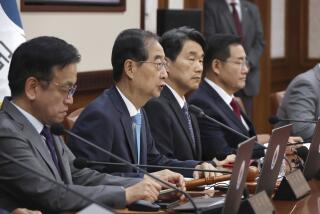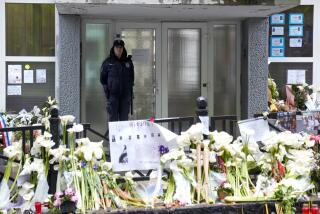U.N. Begins Trial Lifting of Yugoslavia Sanctions : Balkans: Move comes in response to Serbian president’s promise to stop supplying rebels in Bosnia. Doubts about pledge linger.
- Share via
BELGRADE, Yugoslavia — As Yugoslavia gained its first symbolic readmission into the circle of civilized nations Wednesday, Serbian President Slobodan Milosevic was casting himself as the victor in a long, painful standoff with the outside world.
The influential Politika newspaper, controlled by Milosevic supporters, trumpeted the reopening of the Belgrade airport as “the beginning of the end” of Yugoslavia’s isolation, with nary a word about the war still raging on its western border.
Questions linger about the sincerity of Milosevic’s vow that he is cutting off war supplies to Bosnian Serb rebels--a promise that won him partial relief from U.N. sanctions imposed in May, 1992, in punishment for his having instigated the Bosnian war.
U.S. Defense Secretary William J. Perry told North Atlantic Treaty Organization allies in Spain last week that he had seen reports suggesting some leakage of war supplies despite the proclaimed cutoff. And German Foreign Minister Klaus Kinkel warned European Union states Tuesday that his government felt the Yugoslav border “could be more effectively sealed.”
Even the U.N. Protection Force has conceded it has hundreds of reports from its troops in Bosnia-Herzegovina of nighttime Yugoslav army helicopter sorties into battle areas held by the Bosnian Serbs.
But on Tuesday, retired Swedish Gen. Bo Pellnas, head of a 135-man border monitoring unit that is not yet fully deployed along the 300-mile frontier, informed the U.N. Security Council that he had seen no evidence Serbia was shipping war materiel to Bosnian Serb allies--a report that automatically triggered a 100-day trial lifting of sanctions prohibiting international air traffic in and out of Yugoslav airports and a ban that prevented cultural and sports contacts.
Within hours, a Russian Aeroflot jet landed in Belgrade in a ceremonial reopening of the airport that had been in diplomatic mothballs for 28 months. The Yugoslav national carrier, JAT, planned to resume international flights today.
The Aeroflot Ilyushin-62 carried fewer than two dozen passengers, but among them was Russian Deputy Foreign Minister Vitaly S. Churkin, Moscow’s special envoy for the Balkan crisis.
“It is a very significant day today,” Churkin said upon arrival. “(Yugoslavia has) firmly chosen the path of peace and political settlement.”
The restored links promise little real relief for an economy ravaged less by the U.N. blockade than by three years of bankrolling wars in Croatia and Bosnia-Herzegovina.
On the contrary, easing sanctions against Milosevic appears to be part of a strategy by outside powers to draw him into efforts to force signing of a peace plan that will nullify the issue of whether the United Nations should lift its arms embargo against the Bosnian government. A harsh dispute over the issue has driven a wedge between the United States and its allies in NATO. Countries with troops on the ground in Bosnia are against arming the Bosnians, while Washington favors correcting what it sees as an immoral imbalance.
By intensifying pressure on the Bosnian Serbs, the five-nation Contact Group trying to force acceptance of its peace plan is probably gambling that Milosevic will eventually be able to depose Radovan Karadzic, his former proxy in the Bosnian Serb leadership.
The Clinton Administration has also reportedly drawn the Muslim-led Bosnian government into the plan to wait out the expected Serbian infighting. An Oct. 15 deadline Clinton set for the Bosnian Serbs to sign the proposed peace plan or face a rearmed government faction has been effectively put off until spring, apparently because both Washington and the Sarajevo leadership doubt Karadzic can survive that long without support from Milosevic.
But like all previous efforts to buy time in hopes the Bosnian war will somehow burn itself out, a delay in lifting the arms embargo may only allow the plight of civilians to worsen while a cohesive strategy for ending the war continues to elude the international community.
Heading into the third winter of Europe’s worst bloodshed since World War II, both warring Bosnian factions are better armed and more determined to hold their ground than they were a year ago.
By contrast, 22,000 troops of the U.N. mission are now focused more on protecting their own ranks than on assisting the beleaguered populations in U.N. “safe areas” they were dispatched to protect.
More to Read
Sign up for Essential California
The most important California stories and recommendations in your inbox every morning.
You may occasionally receive promotional content from the Los Angeles Times.














